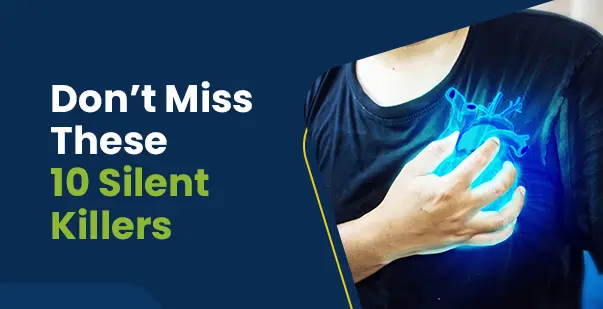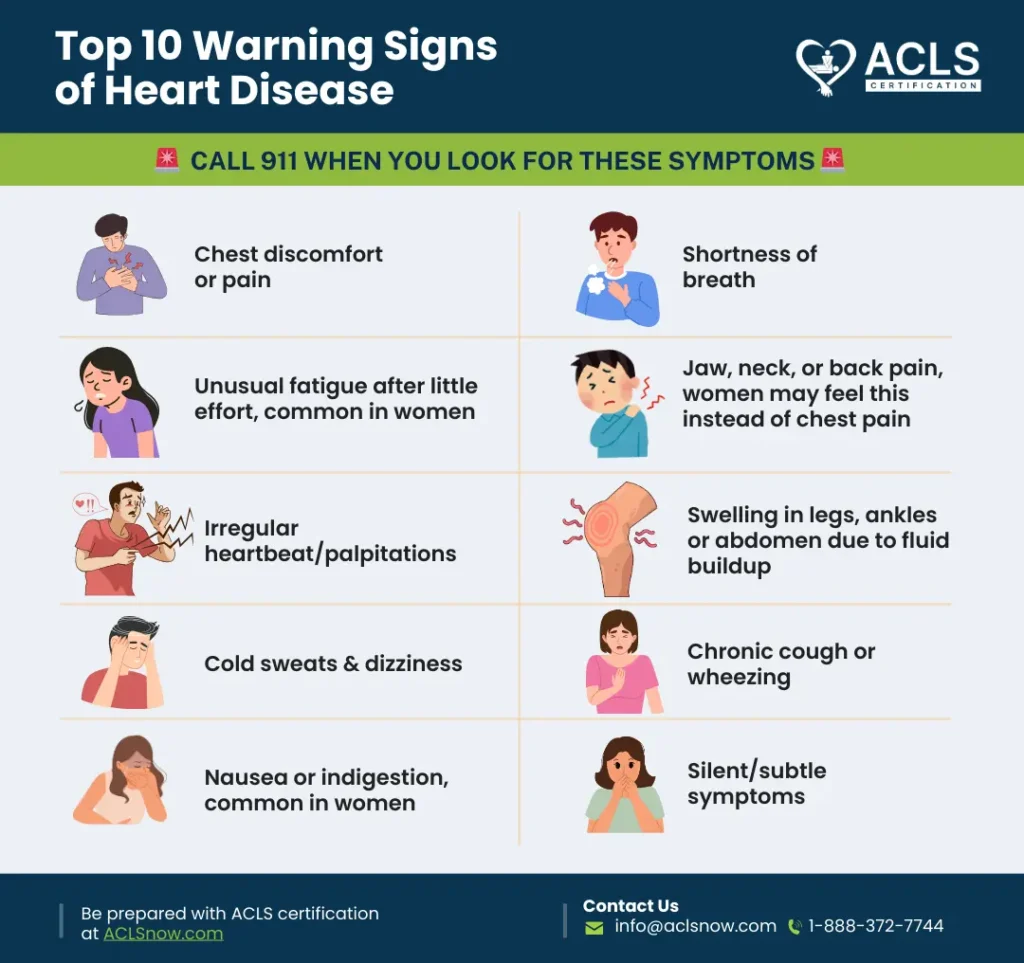Suppose you walk down a flight of stairs, only to notice that your chest has tightened suddenly. You may also feel slightly breathless and a little lightheaded. This condition may brush off suddenly, and you may not even think about it anymore during the day. But what if that moment was when your heart sent you a signal regarding some upcoming health issue?
Heart disease is the leading cause of death globally, responsible for nearly 17.9 million deaths every year, according to the World Health Organization. Therefore, everyone must recognize the early signs of heart disease so that it does not become a life-threatening emergency. Let’s highlight these top 10 signs in the following guide.
Master ACLS Now
Get ACLS certified with confidence
Top 10 Warning Signs of Heart Disease
1. Chest Discomfort or Pain
- Feels like pressure, tightness, burning, or heaviness.
2. Shortness of Breath
- Breathless during routine activities or at rest.
3. Unusual Fatigue
- Tired after little effort; common in women.
4. Jaw, Neck, or Back Pain
- Often overlooked; women may feel this instead of chest pain.
5. Irregular Heartbeat/Palpitations
- Fluttering or racing heart; risk increases with dizziness or chest pain.
6. Swelling in Legs, Ankles or Abdomen
- Fluid buildup — tight shoes, puffiness.
7. Cold Sweats & Dizziness
- Sudden sweating, faintness, or low oxygen to the brain.
8. Chronic Cough or Wheezing
- Night cough; may bring up pink or white mucus.
9. Nausea or Indigestion
- Stomach upset, bloating, or heartburn-like symptoms; common in women.
10. Silent/Subtle Symptoms
- Lightheadedness, mild breathlessness, or fatigue — easy to dismiss.
(Red alert button)Call 911 when you look for these symptoms.
Early action saves lives.
Be prepared with ACLS certification at ACLSnow.com.
Do you think heart disease always starts with a dramatic heart attack? No. It often begins with minor symptoms in several cases that may be easy to overlook. Sometimes, you may also mistake it for other conditions. People often delay seeking help, thinking these signs of minor heart blockage are just part of getting older or feeling stressed. To stay one step ahead, here are the top 10 warning signs of heart disease that everyone must recognize:
1. Chest Discomfort or Pain
Chest pain or discomfort is the most serious warning sign of heart disease recognized worldwide. It can feel like pressure, tightness, or a squeezing sensation in the chest. A few also describe it as a burning or heaviness, similar to indigestion. Chest pain is the signal of reduced blood flow to the heart or even an impending heart attack.
If you are wondering, how do I know if I have heart disease, persistent or recurring chest discomfort is one of the clearest signs. So, you should consult a doctor immediately.
2. Shortness of Breath
If you often feel breathless during regular activities or while resting, this could indicate that your heart is struggling to pump blood efficiently. A weak heart cannot deliver oxygen-rich blood to muscles and tissues. This often leads to difficulty in breathing. This is particularly alarming when it appears without physical exertion or is accompanied by fatigue.
3. Unusual Fatigue
Exhaustion after minimal effort or feeling drained throughout the day is not something to ignore. Constant tiredness can be a symptom of a failing heart, as your body isn’t getting enough oxygenated blood. This fatigue can interfere with daily life and worsen over time. Women are more likely to report fatigue as a primary symptom, often without experiencing the usual chest pain.
4. Pain in Jaw, Neck, or Back
Unexplained pain in these areas may be one of the overlooked signs of heart disease, especially among women. Nerve pathways can cause referred pain in the neck, jaw, and even the upper back. So, it won’t be wrong to say that jaw pain is a sign of heart trouble in women. It’s a real and recognized symptom that can appear silently before a cardiac episode.
5. Irregular Heartbeat or Palpitations
Noticing a fluttering or racing heart? While occasional irregular beats are harmless, consistent heart issue symptoms like palpitations can be a warning sign of arrhythmia or another cardiac condition. Therefore, you must seek medical attention immediately if this symptom is accompanied by dizziness, breathlessness, or chest discomfort.
6. Swelling in Legs, Ankles, or Abdomen
Sometimes, you may have noticed swelling in your legs, ankles, or abdomen. This happens due to fluid retention when the heart’s ability to pump effectively is compromised. Blood backs up in the veins, and the body retains fluid, which leads to swelling. If you notice tight shoes or persistent puffiness, never disregard it as a minor inconvenience and seek medical help. This symptom is often associated with a failing heart and is frequently missed in early diagnosis.
7. Cold Sweats and Dizziness
Breaking into a cold sweat, especially when you’re not physically exerting yourself, could be a red flag. When your heart is under stress or experiencing poor blood flow, your body responds by producing sweat. Dizziness or feeling faint may also occur due to inadequate oxygen reaching the brain. These are common heart disease symptoms that many people initially overlook.
8. Chronic Cough or Wheezing
A persistent cough that doesn’t seem to go away could be more than a respiratory issue. When your heart fails to pump efficiently, fluid may build up in the lungs, which leads to a symptom of a failing heart. The cough may be dry or produce white or pink mucus. Wheezing, particularly at night, is another associated sign.
9. Nausea or Indigestion
Stomach-related symptoms like nausea, bloating, or indigestion may also be signs of heart disease. These symptoms are especially common in women who may often mistake them for gastrointestinal issues. These issues could indicate early signs of heart disease if they occur along with other symptoms like fatigue or jaw pain.
10. Silent or Subtle Symptoms
Did you know that some people develop a minor heart blockage and remain unaware for years? Yes, they might dismiss certain symptoms like lightheadedness, mild shortness of breath, or general fatigue. These signs may often mean reduced blood flow to the heart, despite not being alarming symptoms.
Please understand that no home method or life support is foolproof when it comes to checking the symptoms of blockage. However, early pattern recognition and routine check-ups can help detect issues before they escalate.
Read More: Cardiac Massage – An Overview and Techniques
How to Check for Heart Blockage at Home
Diagnosing heart blockage often requires medical testing such as an electrocardiogram (ECG), stress tests, or angiograms. However, there are some preliminary heart issues symptoms and self-check methods that may help you identify if something’s wrong before it escalates. Here are the different ways in which you can check for signs of a bad heart blockage at home:
Monitor Unusual Fatigue
Persistent fatigue, which is usually not based on your lifestyle, sleep, or activity levels, can signal reduced oxygen supply because of partial heart blockage. Make sure to pay attention when walking short distances or climbing stairs, especially if it leaves you winded.
Watch for Chest or Jaw Discomfort
Recurring pressure or tightness in the chest, or a sensation of heaviness that radiates to your arms, shoulders, or jaw, especially on exertion, could indicate compromised blood flow. Many people don’t realise that jaw discomfort may be a sign of heart trouble in women, often mistaken for dental issues or stress.
Check for Shortness of Breath
A healthy heart pumps blood efficiently. So, you might experience breathlessness during light activity or even while lying down if your heart is struggling. These are often considered the symptoms of a weak heart.
Monitor Your Pulse
Using a home pulse oximeter or manually checking your pulse rate and rhythm can help disclose symptoms of a failing heart. Irregular or very slow/fast heartbeats may point toward underlying cardiovascular issues.
Pay Attention to Swelling
Look for swelling in the ankles, feet, or abdomen. This can be a sign that the heart isn’t pumping blood effectively, causing fluid buildup, which is another indicator of heart failure or other serious cardiac conditions.
Use the Stairs Test
Climb a flight of stairs and check if you feel anything. In the case that you experience chest tightness, breathlessness, or extreme fatigue, that could be a warning sign of heart issues. Consult your healthcare professional immediately if you feel this is something that needs attention.
Read More: How to Become a Cardiologist?
Gender-Specific Symptoms: Why Women Should Be Extra Alert
Women often experience different symptoms from men, making diagnosis more difficult. Signs such as jaw pain, back pain, nausea, fatigue, and anxiety may appear without the typical chest pain.
So when we talk about signs of heart trouble in women, it’s critical to look beyond the obvious and trust subtle changes in how the body feels.
Even if you aren’t showing severe symptoms now, certain habits and conditions can put you at greater risk. Managing the following factors can prevent the progression of early warning signs into full-blown heart disease:
- Smoking
- High cholesterol
- Sedentary lifestyle
- Poor diet (especially high in salt and saturated fats)
- Chronic stress
- Obesity and diabetes
Get Certified to Learn About the Signs of Heart Disease
Your heart is your body’s most vital organ and works around the clock to keep you alive. Ignoring the warning signs of heart disease can cost far more than comfort. In the worst cases, a cardiac emergency can cost your life. Pay attention to every small symptom, no matter how insignificant it seems. Early detection and lifestyle changes can prevent long-term complications and ensure a healthier future.
If you’re experiencing any combination of the symptoms mentioned in this guide, seek medical advice immediately. Prevention starts with awareness, and awareness begins with you. If, you are a healthcare professional, you can enroll in an advanced cardiac life support (ACLS) certification to learn more about the signs of heart disease.








